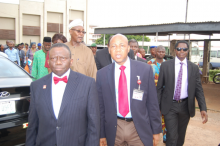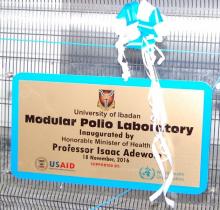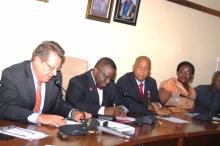Another Public Health Chapter Opens in Nigeria with Historic Unveiling of Modular Laboratory
Ibadan, 18 November, 2016 - Public health in Nigeria recorded a historic event in Ibadan, Oyo State on 18 November, 2016 with the commissioning of a Modular Laboratory (lab). The modular lab, which was handed over to the Department of Virology, University of Ibadan, by the World Health Organization (WHO) was purchased with a grant from United States Agency for International Aid (USAID). The lab is expected to primarily support polio eradication activities in Nigeria.
The Minister of Health, Professor Isaac Adewole who led dignitaries on a tour of the facilities in the lab, stated that it will “enhance ability of the system to not only promptly respond to polio outbreaks in Nigeria, but also to other viral diseases in the West Africa sub-region”.
He observed that the Ibadan lab currently processes 98.6% of all stool samples received within 14 days and is meeting key performance indicators, as evidenced by the annual accreditation by WHO. Professor Adewole further appreciated WHO for the technical support to the lab and the USAID for the grant and opined that “we can now contribute fully to polio and other disease surveillance initiatives”.
Nigeria has two WHO accredited National Polio Laboratories located in the University Teaching hospitals in Maiduguri and Ibadan. The modular lab will facilitate testing of sewage samples from 48 sites in 13 states within the context of environmental surveillance to provide valuable complementary information to acute flaccid paralysis (AFP) surveillance especially at an auspicious time as the present with polio resurgence in the country.
In her remarks, Dr Fiona Braka who spoke on behalf of the acting WHO Country Representative in Nigeria, stated that the modular lab is a standard BSL2 laboratory that can support diagnosis of other viral infections such as measles, rubella, rotavirus, yellow fever, dengue among many others in Nigeria, thus a good potential structure with regards to the transition of polio assets for other disease control interventions.
She expressed WHO’s acknowledgement of government for the leadership in polio eradication and USAID for funding polio eradication activities in the country, and pledged WHO’s continued support till “Nigeria reaches polio- free status and certification in the African region and beyond”.
Earlier, the US Consul General, John Bray, noted that It is critical for Nigeria to have laboratories that can provide convincing diagnostic evidence of the absence of wild poliovirus infections in humans and the environment.
According to him, the United States of America will continue to support Nigeria towards strengthening national capabilities and contributing expertise and resources to regional and international efforts to combat polio as the diseases has no boundaries.
Over 100 delegates from government and partner agencies as well as the academia and the media attended the epoch-making event.
_________________________________________
For more information, please contact:
• Technical contact:
Dr Fiona Braka; Tel: +234 703 170 5252; Email: %20%20%20%20brakaf [at] who.int ( brakaf[at]who[dot]int)
• Media contact:
Ms Charity Warigon; Tel: +234 810 221 0093; Email: %20%20%20%20warigonc [at] who.int ( warigonc[at]who[dot]int)
_________________________________________
01 (L-R) Consul General John Bray, Prof. Adewole, Prof. Temitope Alonge CMD, Univerversity of Ibadan, Dr Braka and renowned virologist, Prof. Oyewole Tomori
02 Minister of Health conucting other dignitaries on a tour of the modular lab.
03 Plaque of the modular laboratory






